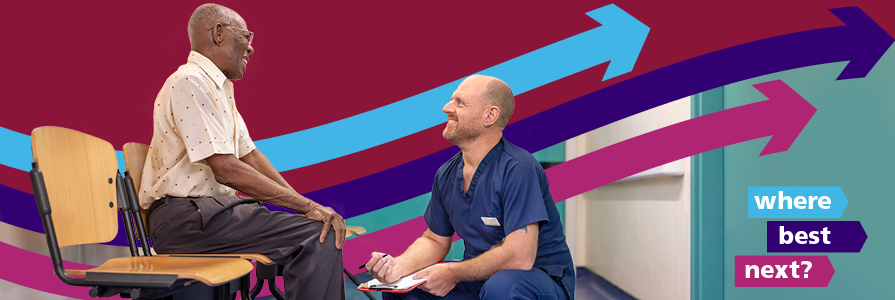When am I going home?
We know that it’s much better for your physical and mental wellbeing to leave an acute hospital as soon as you are medically ready to do so. That’s why we are doing everything we can to reduce prolonged hospital stays and ‘get you home to what matters to you’, this can be to your beloved pet, your favourite armchair or simply using your own tea bags again. If you can’t go straight home, we will work with you to provide an alternate place most suited to your needs.
Once we are happy that you can be discharged, your hospital bed will become available to another person who needs a high level of care.
‘When am I going home?’ – Colin’s hospital to home story
Why your hospital discharge is important
When you no longer need hospital care, it is better to continue your recovery at home or at another location in the community. This is because:
- Nobody wants to stay in hospital any longer than is necessary.
- Being in hospital with others who are unwell can sometimes expose you to infection.
- Extremely poorly patients may not be able to access an urgent hospital bed if they are occupied by patients who no longer need them.
- Meaningful and accurate assessments of your needs, as well as long term decisions about your care, are better made when you are outside of the hospital.
- If you stay in bed for long periods, you will lose muscle strength.
What we will do for you and how we will help prepare for discharge…
As soon as you arrive in hospital, our main priority is to get you better again so you can return to the comfort of your own home, or a suitable alternate place.
Your nurse will be responsible for planning your care and discharge with you and your family/carer. To read more about your time in hospital visit: About your stay and discharge – United Lincolnshire Hospitals (ulh.nhs.uk)
Never be worried about speaking to staff in charge of your discharge to make sure you have everything you need. This includes a date, care plan and equipment. It is also very important that you ask 4 questions every day when you see the team caring for you:
- What is the matter with me?
- What is going to happen to me today?
- When am I going home?
- What is needed to get me home?
You’ll be involved in the discharge planning and agree a care plan together. This should include things like:
- treatment and care when you get home
- who’s in charge of your care and how to contact them
- when and how often you need care
How you can help with your discharge?
What can I do as a friend, family member or carer?
After you are discharged
Next steps after leaving hospital
Will I need to pay for my care?

Campaign toolkit
Your support is crucial in helping to make this campaign a success and helping to drive down long hospital stays in Lincolnshire. Find out more and download our partner toolkit.

Staff Hub
You have an important part to play in reducing long stays for patients in hospital. There are a number of practical actions you can take to help get patients to the best place for them.